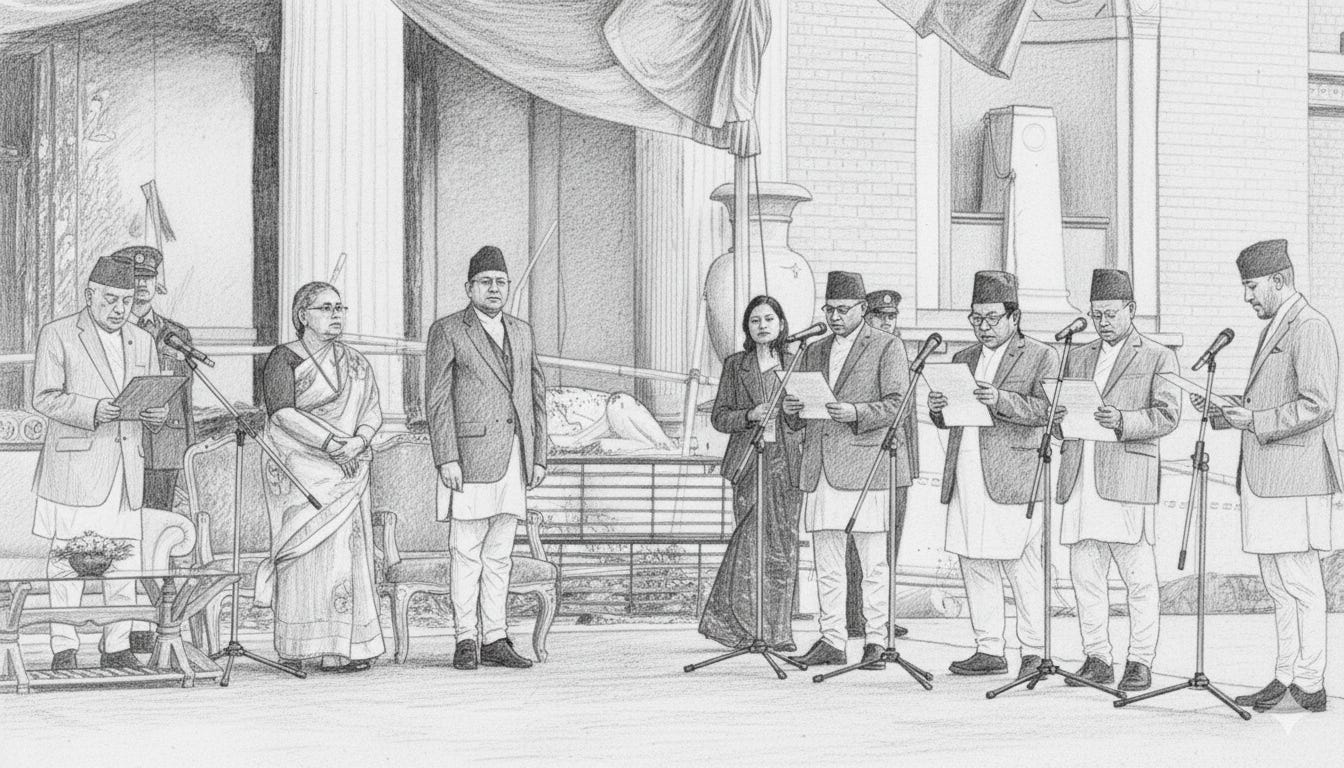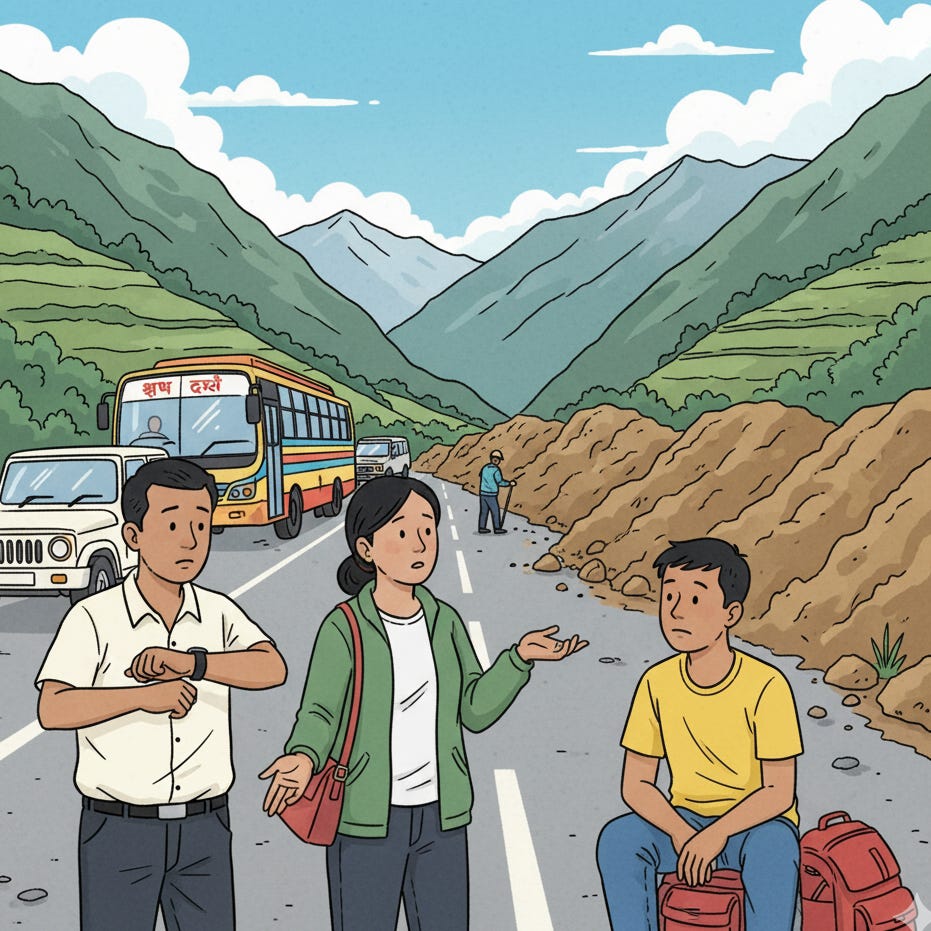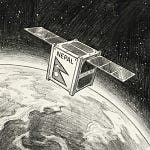This week, Nepal navigates a pivotal moment of transition and turmoil. In Kathmandu, a new interim government begins the monumental task of rebuilding trust and ensuring accountability in the wake of the historic Gen-Z protests. This political shift unfolds as the entire nation embraces the spirit of its largest festival, Dashain, a celebration profoundly challenged by a nationwide landslide crisis that has brought travel to a standstill. The economic toll of the recent unrest is also coming into sharp focus, with staggering losses rattling the financial sector and leaving an already fragile economy at a critical crossroads. Meanwhile, stories of deep concern and significant progress for the Nepali diaspora unfold, from the ongoing plight of Bipin Joshi in Gaza to a landmark change in citizenship law. Here’s a deeper look at the key stories shaping Nepal this week.
Share the love! Help others that care about Nepal stay up to date the easy way. If you like this issue, share it with a friend who follows Nepal and hit Subscribe for your weekly dose of curated, can’t-miss updates.
Politics & Governance 🏛️
In the wake of the Gen-Z protests, Nepal has seen a significant political shift with the formation of a new interim government led by former Chief Justice Sushila Karki. Her administration was formed after the resignation of the KP Sharma Oli government and has been tasked with holding fresh elections on March 5, 2026 (The Rising Nepal). Prime Minister Karki has since expanded her cabinet, appointing several professionals from non-political backgrounds in a move to restore public trust. The new appointments include National Innovation Center founder Mahabir Pun as Minister for Education, Science and Technology and veteran journalist Jagdish Kharel as Minister for Communications and Information Technology, expanding the cabinet to eight members (Nepali Times).

A key priority for the new government is addressing the aftermath of the protests, which resulted in at least 74 deaths and widespread destruction of property (MyRepublica). To ensure accountability, a high-level judicial probe commission has been formed under the leadership of former Justice Gauri Bahadur Karki to investigate the loss of life and instances of excessive force. The commission has already begun its work, asking the Home Ministry and the public to submit details of the damages. In parallel, police have intensified operations, arresting suspects involved in looting, arson, and the killing of two police personnel during the unrest (The Annapurna Express).
Looking forward, the interim government has launched several initiatives aimed at reform and improving governance. In a direct response to the demands of the youth movement, President Paudel has issued an ordinance to amend the Voter List Act, enabling new voter registration for young citizens who have reached voting age (MyRepublica). To enhance transparency and accountability, the Prime Minister’s Office has launched a public grievance hotline (9851145045) for citizens to report misconduct or inefficiencies in government services (MyRepublica). The government is also grappling with the logistical challenges of the aftermath, including managing the return of over 8,000 of the 14,549 inmates who escaped from prisons during the turmoil and appealing for the return of stolen government property.
The new administration is also signaling a broader shift in governance, emphasizing performance and a zero-tolerance policy on corruption. In her first address to the nation, PM Karki stressed that social justice and good governance are top priorities. This sentiment was echoed by newly appointed minister Kulman Ghising, who announced that contracts for long-delayed and neglected development projects will be terminated (The Himalayan Times). Meanwhile, political tensions remain palpable. The Nepali Congress spokesperson condemned the violence during the protests, attributing it to infiltrators trying to attack democratic values. However, pressure from activists continues, highlighted by an encounter where Gen-Z leader Sudan Gurung directly told NC General Secretary Gagan Thapa that the old ways of politics “won’t do anymore” (MyRepublica).
People & Culture
The spirit of Nepal’s greatest festival is in the air as Bada Dashain has officially begun with the traditional Ghatasthapana rites observed in homes across the country (The Himalayan Times). This has sparked the annual mass exodus from the capital, with nearly 200,000 people leaving the Kathmandu Valley in just five days to celebrate with their families. In preparation for the festivities, authorities have deployed over 4,700 police officers for security in Kathmandu, and the International Panchang Determination Committee has even announced auspicious Tika timings for Nepalis living around the world, ensuring the diaspora can connect with the celebrations back home (The Himalayan Times).
However, the joyous journey home has turned into a nightmare for thousands, as this year’s Dashain travel is being severely crippled by a nationwide landslide crisis. Heavy monsoon rains have triggered devastating landslides that have completely blocked crucial arteries like the Prithvi Highway and the Narayanghat-Muglin road section, leaving travelers stranded for days on end (The Rising Nepal). An in-depth analysis of the recurring disasters, particularly at Tuin Khola, suggests these are not random acts of nature but predictable failures resulting from a dangerous mix of fragile geology, intense rainfall, and unscientific road construction. The travel chaos has become so severe that it has caused a surge in demand for domestic flights as people desperately seek alternative ways to reach their hometowns for the festival (Nepal News).
Amidst the widespread disruption, stories of community resilience have emerged. In Parbat district, after a major road was washed away and government help did not arrive, around 400 villagers took matters into their own hands, repairing the vital route through voluntary labor just in time for the festival (Khabarhub). Beyond the travel crisis, other public welfare issues continue to be a concern. Health authorities in Birgunj are struggling to contain a persistent cholera outbreak that has now infected at least 240 people, while in Kanchanpur, residents are living in constant fear as wild elephants invade their villages nightly, destroying crops and property (The Himalayan Times).
On a more hopeful note, the new Education Minister, Mahabir Pun, has begun his tenure with a flurry of activity aimed at reform. He has already issued directives to improve technical education curriculums, establish a formal complaint mechanism for students and parents, and ensure that all exam results are published within a strict three-month deadline (The Annapurna Express).
Economy & Development 💸
The recent Gen-Z protests have delivered a staggering blow to Nepal’s economy, with the scale of the financial fallout becoming clearer. Insurance companies are bracing for record-breaking payouts after receiving nearly 2,500 claims for damages from arson and vandalism, with the total value exceeding a massive Rs 22 billion (The Annapurna Express). The destruction was widespread, affecting both public and private property; the Ullens Education Foundation alone reported losses of Rs 1.25 billion to its school infrastructure, while repairs have begun on the historic Singha Durbar, which was damaged by fire (MyRepublica).
The turmoil sent shockwaves through the country’s financial markets. In a week of unrest, the Nepal Stock Exchange (NEPSE) witnessed a dramatic plunge that erased Rs 268 billion in investor wealth, forcing regulators to repeatedly halt trading due to the steep freefall (MyRepublica). In response to the crisis facing the private sector, the new interim government has announced an initial relief measure, allocating Rs 9.80 billion for an interest subsidy on concessional loans to support businesses that suffered heavy losses during the protests (MyRepublica).
Analysts describe Nepal’s fragile economy as being at a critical crossroads, with the new government facing the immense challenge of rebuilding devastated infrastructure on top of pre-existing problems like high unemployment and a heavy dependence on remittances (MyRepublica). This instability poses a severe threat to key sectors, particularly tourism. The hotel industry, which was just beginning to recover from the pandemic, is now facing another profound crisis, battling the combined pressures of political turmoil, rising inflation, and climate risks that threaten its long-term survival (The Himalayan Times).
Diaspora & Globalisation

The plight of Bipin Joshi, the Nepali student held captive in Gaza, has taken a distressing turn after Hamas’s armed wing released what it called a “farewell picture” featuring 47 hostages, including Joshi (MyRepublica). While the title of the photo collection has caused significant alarm, analysts suggest his appearance in the image offers fragile hope that he is still alive. In a determined effort to secure his freedom, Bipin’s mother and sister have traveled to the United States to campaign on an international stage and increase pressure for his safe release (The Rising Nepal).
On the policy front, in a move with major implications for the diaspora, President Ramchandra Paudel has officially authenticated the bill to amend the Nepal Citizenship Act. The new law is a significant step forward as it introduces provisions allowing children to acquire citizenship through their mothers, though some rights activists have noted that patriarchal biases still remain (The Annapurna Express). Meanwhile, a sobering report has highlighted the ongoing risks faced by Nepali migrant workers abroad, revealing that 51 Nepalis died in the United Arab Emirates in the first two months of the current fiscal year from causes including workplace accidents, road accidents, and health issues (MyRepublica).
Let’s connect
Enjoying this issue? 📩 Share it with a friend & let’s keep Nepalis worldwide in the loop! Got thoughts? Hit reply—we’re all ears! Or let us know what you think via our Feedback form or follow us on Facebook | LinkedIn
P.S. Got a story or issue you'd like us to cover next week? Drop us a reply — we're building this space together.
About Nepali Diaspora Digest:
The Nepali Diaspora Digest connects the global Nepali community with curated news, insights, and stories that matter most. Join us as we celebrate and explore the diverse voices and achievements of Nepalis worldwide.
Partner shout out
belayat.uk: helping Nepalis connect in the UK on jobs, housing, events and finding local Nepali owned businesses














